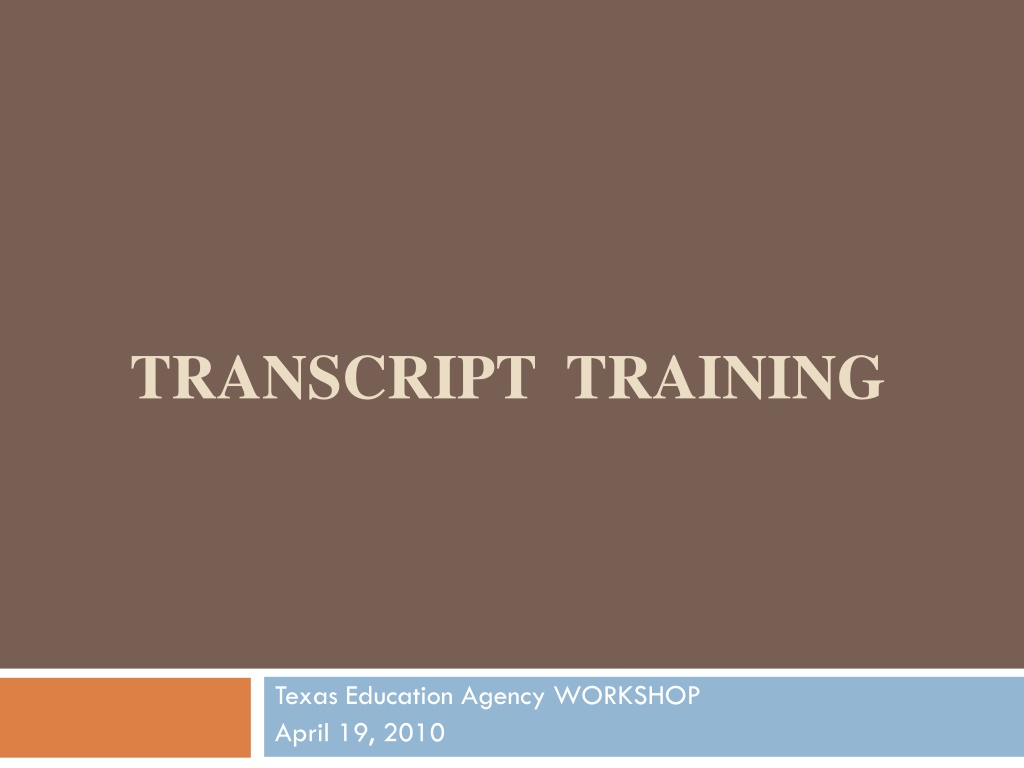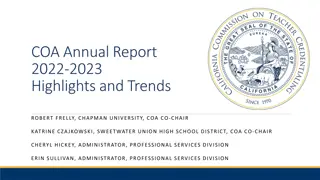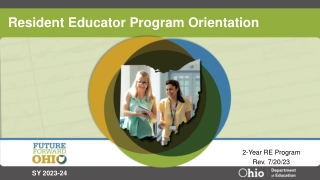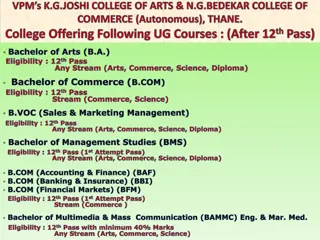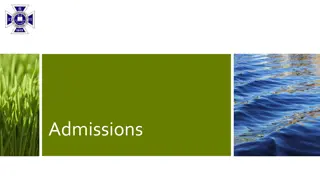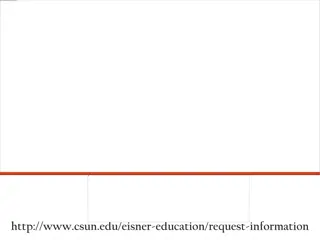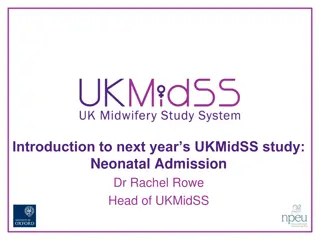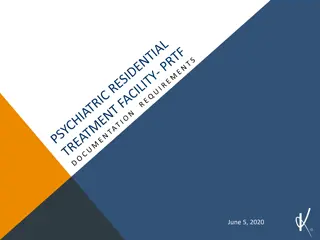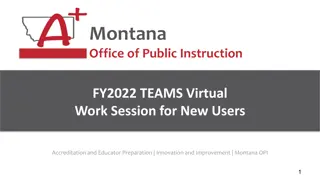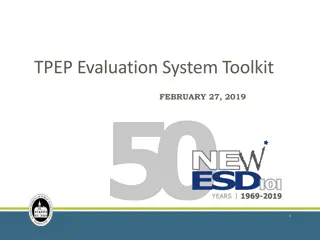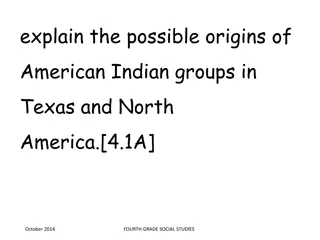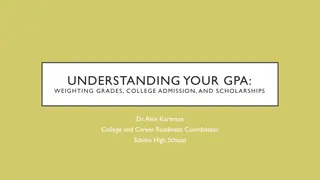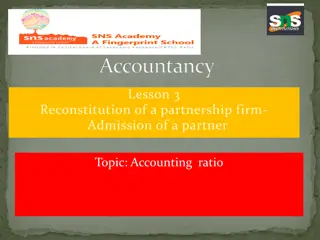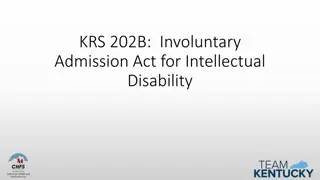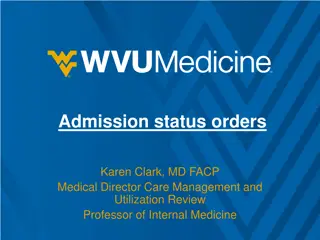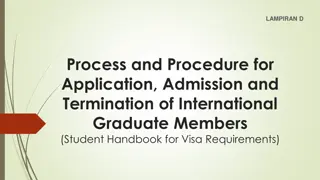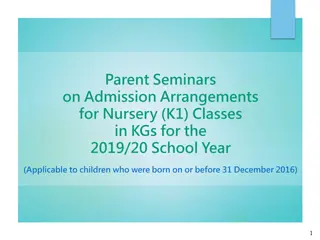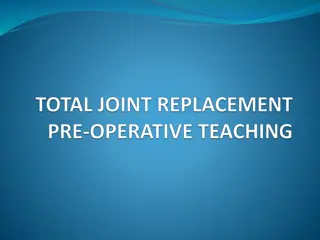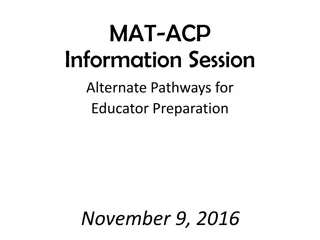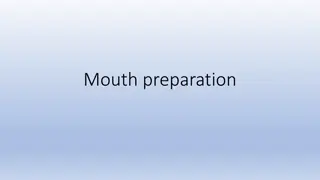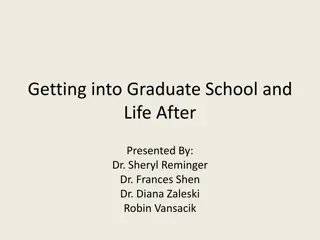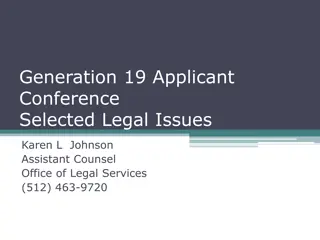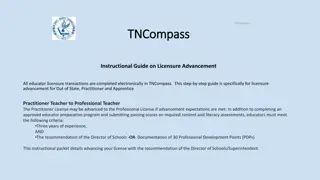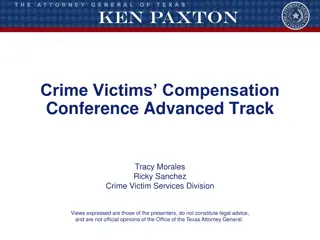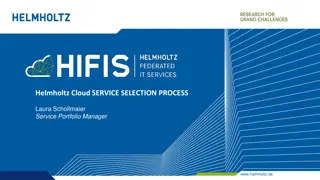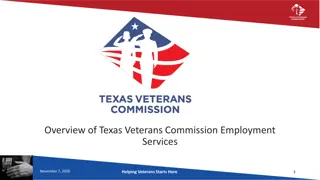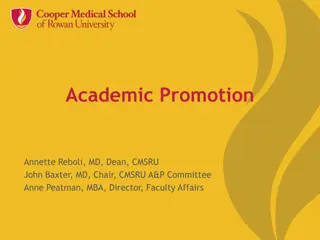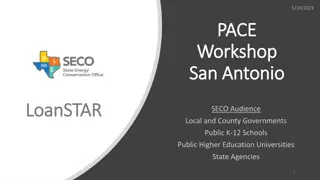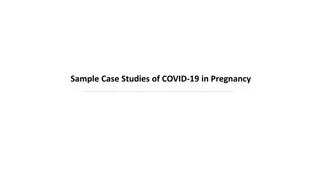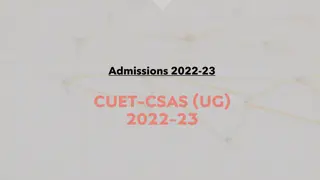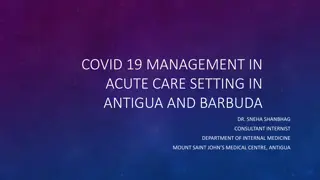Texas Educator Preparation Program Admission Criteria
Texas Administrative Code Title 19, Chapter 227 outlines the admission criteria for educator preparation programs in Texas. Candidates must meet specific requirements based on the type of program they are applying to, such as having a minimum GPA of 2.5, relevant work experience, and subject-specific content knowledge. Official university/college transcripts are required for all applicants.
Download Presentation

Please find below an Image/Link to download the presentation.
The content on the website is provided AS IS for your information and personal use only. It may not be sold, licensed, or shared on other websites without obtaining consent from the author. Download presentation by click this link. If you encounter any issues during the download, it is possible that the publisher has removed the file from their server.
E N D
Presentation Transcript
TRANSCRIPT TRAINING Texas Education Agency WORKSHOP April 19, 2010
TEXAS ADMINISTRATIVE CODE TITLE 19 EDUCATION PART 7 STATE BOARD FOR EDUCATOR CERTIFICATION CHAPTER 227 PROVISIONS FOR EDUCATOR PREPARATION CANDIDATES RULE 227.10 Admission Criteria (a) The educator preparation program delivering educator preparation shall require the following minimum criteria of all candidates prior to admission to the program, except candidates for career and technology education certification: (1) for an undergraduate university program, a candidate shall be enrolled in an educator preparation program from an institution of higher education that is accredited by a regional accrediting agency, as recognized by the Texas Higher Education Coordinating Board (THECB); (2) for an alternative certification program or post-baccalaureate program, a candidate shall have a baccalaureate degree earned from and conferred by an institution of higher education that is recognized by one of the regional accrediting agencies by the THECB, specified in paragraph (1) of this subsection;
(3) for an undergraduate university program, alternative certification program, or post- baccalaureate program, a candidate shall meet the following criteria in order to be eligible to enter an educator preparation program: (A) an overall grade point average (GPA) of at least 2.5 or at least 2.5 in the last 60 semester credit hours; or (B) documentation and certification from the program director that a candidate's work, business, or career experience demonstrates achievement equivalent to the academic achievement represented by the GPA requirement. This exception to the minimum GPA requirement will be granted by the program director only in extraordinary circumstances and may not be used by a program to admit more than 10% of any cohort of candidates; and (C) for a program candidate who will be seeking an initial certificate, a minimum of 12 semester credit hours in the subject-specific content area for the certification sought, a passing score on a content certification examination, or a passing score on a content examination administered by a vendor on the Texas Education Agency (TEA)-approved vendor list published by the commissioner of education for the calendar year during which the candidate seeks admission;
University/College Transcripts General Information Need: Official transcripts of all college credits, bearing the seal and signature of the college registrar. (Recommend transcripts be accepted only in a sealed university/college envelope)
University/College Transcripts If Out Of Country Need: An original, detailed report or course-by-course evaluation for professional licensing of all college-level credits prepared by a credential evaluation service recognized by TEA. The evaluation must be signed by an authorized representative of the evaluation service and must verify that the applicant: Holds the equivalent of a bachelor's degree granted by an accredited institution of higher education in the United States, including the month, day and year that the degree was conferred. Official or certified copy of foreign transcript
Credential Evaluation Service These services are known to TEA as following the standards of recognized national organizations of foreign credential evaluators. does not approve or accredit credential evaluation services. Evaluation Service, Inc. 33 W. North Avenue #284 Chicago, IL 60610 Phone: (847) 477-8569 Fax: (312) 587-3068 Email: info@evaluationservice.net American Association of Collegiate Registrars and Admission Officers Office of International Education Services One Dupont Circle NW, Suite 520 Washington, DC 20036-1135 Phone: (202) 296-3359 Fax: (202) 822-3940 Email: oies@aacrao.org Foreign Academic Credential Service, Inc. P.O. Box 400 Glen Carbon, IL 62034 Phone: (618) 656-5291 Fax: (618) 656-5292 Email: facs@aol.com American Evaluation and Translation Service 407 Lincoln Road, Suite 11-J Miami Beach, FL 33139 Phone: (786) 276-8190 Fax: (786) 524-0448 Email: info@aetsinternational.com Foreign Consultants, Inc. 3000 Dundee Road, Suite 209 Northbrook, Illinois 60062 Phone: (847) 498-4499 or 3394 Email: info@foreignconsultacts.com C.E.I.E. Specialists, Inc. 10575 Katy Freeway Suite #432 Houston, Texas 77024-1025 Phone: (713) 952-6753 Fax: (713) 467-2474 Email: sant2@aol.com Foreign Credential Services of America 1910 Justin Lane Austin, TX 78757 Phone: (512) 459-8428 Fax: (512 459-4565 Email: info@fcsa.biz Center for Applied Research, Evaluations, & Education, Inc. P.O. Box 20348 Long Beach, CA 90801 Phone: (562) 430-2030 Fax: (562) 430-8215 Email: evalcaree@earthlink.net The Foreign Educational Document Service P.O. Box 4091 Stockton, CA 95204 Phone: (209) 948-6589 Email: foredocs@inreach.com Center for Educational Documentations, Inc. PO Box 231126 Boston, MA 02123-1126 Phone: (617) 338-7171 Fax: (617) 338-7101 E-mail: info@cedevaluations.com Foundation for International Services, Inc. Foundation for International Services, Inc. 14926 35thAvenue West, Suite 210 Lynwood, WA 98087 Phone: (425) 248-2255 Fax: (425) 248-2262 info@fis-web.com Educational Credential Evaluators, Inc. P.O. Box 514070 Milwaukee, WI 53203-3470 Phone: (414) 289-3400 Fax: (414) 289-3411 Email: eval@ece.org Global Credential Evaluators, Inc. Southeast P.O. Box 1904 Ocean Springs MS 39566 228-818-4487 FAX 512-528-9293 Email: jb@gcewest.com Education Evaluators International 11 South Angell Street #348 Providence, R.I. 02906 Phone: (401) 521-5340 Fax: (401) 437-6474 Email: gary@educei.com Global Credential Evaluators, Inc. P.O. Box 9203 College Station, TX 77842-9203 800-517-4754 Fax: (512) 528-9293 Email: gce@gceus.com Educational Records Evaluation Service, Inc. 601 University Ave, Suite 127 Sacramento, CA 95825 Phone: (916) 921-0790 Fax: (916) 921-0793 Email: edu@eres.com Global Credential Evaluators, Inc.West P.O. Box 6526 Glendale, AZ 85312 602-769-7825 FAX: (512) 528-9293 Email: Margaret@gceus.com
Credential Evaluation Service Global Education Group, Inc. 1650 Alton Road Miami Beach, FL 33139 Phone: (305) 534-8745 Fax: (305) 534-3487 Email: global@globaledu.com SpanTran Educational Services, Inc. 7211 Regency Square Blvd., Suite 205 Houston, TX 77036-3197 Phone: (713) 266-8805 Email: info@spantran-edu.org World Education Services, Inc. P.O. Box 745 Old Chelsea Station New York, NY 10113-0745 Phone: (800) 937-3895 Fax: (212) 966-6395 Email: info@wes.org Globe Language Services 319 Broadway New York, NY 10007 Phone: (212) 227-1994 Fax: (212) 693-1489 Email: info@globelanguage.com International Academic Credential Evaluator, Inc. P.O. Box 2465 Denton, TX 76202-2465 Phone: (940) 383-7498/Fax: (940) 382-4874 Phone: (972) 664-1584/Fax: (972) 690-7187 Email: staff@iacei.net Worldwide Education Consultant Services 5521 N. Expressway 77 Brownsville, TX 78520 Phone: (956) 350-4660 Fax: (956) 350-2462 Email: argonzalez43@yahoo.com International Consultants of Delaware, Inc. 625 Barksdale Road, Suite 109 Newark, DE 19711-3258 Phone: (302) 737-8715 Fax: (302) 737-8756 Email: icd@icdel.com International Education Research Foundation, Inc. P.O. Box 3665 Culver City, CA 90231-3665 Phone: (310) 390-6276 Fax: (310) 397-7686 Email: information@ierf.org Josef Silny & Associates, Inc. International Education Consultants P.O. Box 248233 Coral Gables, FL 33124 Phone: (310) 258-9451 Fax: (310) 342-7086 Email: info@jsilny.com Lincoln International Educational Associates P.O. Box 3043 Lawrence, KS 66046-0043 Phone: (785) 843-1270 Fax: (785) 84-1270 Email: clincoln@sunflower.com SDR Educational Consultants 10134 Hammerly, No. 192 Houston, Texas 77080 Phone: (713) 460-5344 Fax: (713) 460-5344 Email: sdrodrig@aol.com
University/College Transcripts Confirm: Candidate has a baccalaureate degree earned from and conferred by an institution of higher education that is recognized by one of the regional accrediting agencies by the Texas Higher Education Coordinating Board (THECB). Website: http://www.thecb.state.tx.us/index.cfm?objectid=68EAEBEC-08AF-66E8- A88903B42174F359
University/College Transcripts Confirm: Grades are posted using semester hours or quarter hours. If quarter hours are used, convert to semester hours when calculating GPA: Formula: quarter hours multiplied by .67 Example: 5 quarter hours X .67 = 3.35 semester hours 4 quarter hours X .67 = 2.68 semester hours 3 quarter hours X .67 = 2.01 semester hours 2 quarter hours X .67 = 1.34 semester hours 1 quarter hour X .67 = .67 semester hour
Determining Overall Grade Point Average (GPA) 1. Determine whether degree conferring transcript posts a cumulative grade point average for all college work for that degree. If cumulative grade point is posted and it is equal to 2.5 GPA or higher, posted cumulative grade point can be used to meet TEA standard. (Can use Bachelor, Masters or Doctorate) 2. If no cumulative GPA is posted on transcript, then GPA is hand calculated for the last 60 semester hours. 3. If cumulative grade point is less than 2.5 GPA, then GPA is hand calculated for last 60 semester hours.
Calculating Overall GPA Start calculations with the last course taken and work backwards. If the person failed a class within the last 60 hours and repeated the same class making a higher grade, do not count the F in the GPA calculations. If the last 60 hours falls in a semester with several grades but not all the semester hours are needed to total 60 hours, take the highest grade(s) within that semester to make 60 hours. Include pass/fail semester hours even though a letter grade has not been issued.
Calculating Overall GPA If the GPA is not a 2.5 or higher using a Masters or Doctorate degree, then calculate using just the Bachelor s degree. Remember, if university is on the quarter system, convert the posted semester hours by .67
Hints for Calculating Overall GPA Using a pencil to mark on the transcript: Make a check mark by the semesters you counted in the last 60 semester hours. Make a line on the transcript indicating where you stopped counting hours. If selecting only part of the semester hours within a semester to meet 60 hours, circle grades used.
Calculating Content GPA Take the best course grade for each content area. Can count CLEP tests if college credit hours are indicated on the transcript. Pass grades can be used if credit hours are indicated on the transcript.
Content Subject Areas Cannot count developmental courses. These courses are usually marked on the transcript or start with 0 course number. Watch to be sure you do not duplicate a course from another transcript. Cannot count the same course twice. On some courses, it may be required that the applicant turn in a university course description to determine if it will apply to the particular core subject.
Content Course Guidelines Math Requirements (Generalist EC-6, Generalist 4-8, Math 4-8 and Math 8-12) Math courses should be from the math department. Should not count courses in accounting, business or finance as math. If college algebra is a required course for one of the math certificates, a course in calculus and/or trigonometry meets the algebra requirement. Analytical geometry does not.
Content Course Guidelines Science requirements (Generalist EC-6, Generalist 4-8 and Science 4-8) Can count any of the natural sciences. Cannot count anthropology, unless a college course description is included to show that it is a college science course equivalent.
Content Course Guidelines Social Studies Requirements (Generalist EC-6, Generalist 4-8, Social Studies 4-8) Should count courses in only these four areas: history government/political science, economics and geography. Should not count psychology, sociology, criminal justice as social studies courses.
Content Course Guidelines English Language Arts & Reading Requirements (Generalist EC-6, Generalist 4-8, ELA & Reading 4-8) Can count any English and Reading courses as long as they are not considered remedial or developmental courses. May consider certain other courses such as Humanities or Communications, if considered as English. (Recommend obtaining a college course description.)
Content Course Guidelines Secondary subject specific certificates (Grades 7-12) Must meet No Child Left Behind guidelines . Must have 24 semester hours in the subject to be taught with 12 semester hours in upper level course work. Upper level is defined as junior or senior level courses. Or Pass the appropriate state exam.
Content Course Guidelines Elementary certificates (Grades EC-6) Have a minimum of 12 semester credit hours in the subject-specific content area for the certification sought. And Pass the appropriate state exam.
Final GPA Guidelines If the applicant does not meet the 2.5 GPA standard for either the last 60 semester hours or for the content area Have the calculations independently re-checked by a second individual.
Apply Guidelines To Worksheet ..\ExcelData\_Master-GPA-ESC XI.xls Apply Guidelines To Worksheet Use A, B, C, D, F and P (Pass) grades. It is not necessary to figure plus or minus for the grade. Use the following grade values: A = 4 points D = 1 point B = 3 points F = 0 point C = 2 points P = 0 point but will give credit. Formula for P will need to be changed on content portion of the form.
Apply Guidelines To Worksheet ..\ExcelData\_Master-GPA-SAMPLE.xls Apply Guidelines To Worksheet Recommend placing a descriptor before course number, especially for Social Studies and Science when identifying content courses. Example: H (history), G (government), E (economics) B (biology), C (chemistry), G (geology) If content GPA needs to be re-checked, this system assists the other person to easily identify the course(s) used for content.
Apply Guidelines To Worksheet ..\ExcelData\_Master-GPA-Taylor.xls Apply Guidelines To Worksheet When using the university s cumulative GPA, be sure to post the GPA and the name of the university. When using the PACT test to show subject content, be sure to post PACT and test name. In comments box, show content approval and highly qualified statement based on PACT. Hope all your GPA calculations are this simple!!
Apply Guidelines To Worksheet ..\ExcelData\_Master-GPA-Smith.xls Apply Guidelines To Worksheet If the university uses the quarter system, be sure to convert quarter hours to semester hours using the formula: Quarter hour(s) multiplied by .67 = semester hour equivalent Example: 5 quarter hours X .67 = 3.35 semester hours
Apply Guidelines To Worksheet ..\ExcelData\_Master-GPA-Garcia.xls Apply Guidelines To Worksheet For a pending graduate, post in comment box. Post approval status and if APPROVED, list highly qualified status/subject area. Show both overall GPA and content GPA for pending graduate. Can change subject areas on worksheet, if needed.
Apply Guidelines To Worksheet ..\ExcelData\_Master-GPA-Dean.xls ..\ExcelData\_Master-GPA-Bui.xls Apply Guidelines To Worksheet If the applicant does not meet GPA requirements, post the deficiencies in the comment box.
Apply Guidelines To Worksheet ..\ExcelData\_Master-GPA-Leah.xls Apply Guidelines To Worksheet If a letter grade is not posted but the university uses some type of passing grade with semester hours posted: In overall GPA section, put in the number of hours posted in CR row. In content GPA section, put in P for grade, then 0 for hours and 0 or points. Post real semester hours above Grand Total (hrs) in shaded area. Change GPA formula box to calculate real semester hours. (In content GPA box, change last formula value to I50)
CONCLUSION The major element in calculating GPA is to be consistent. The provided worksheet and guidelines are just that A Guide that can be adapted to your individual program needs.
